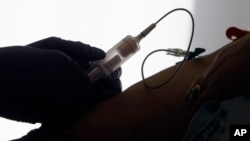Scientists at Johns Hopkins University (JHU) are reporting progress in developing a blood test to detect eight types of cancer at an early stage, including some of the most deadly ones that are difficult to detect with existing screening tools.
In a study published Thursday in the journal Science, JHU scientists examined how well their experimental test detected cancer in people already diagnosed with the disease.
In blood samples from more than 1,000 patients already diagnosed with cancer, the test detected the cancer in about 70 percent of the subjects.
Nikolas Papadopoulos, a professor of oncology and pathology at Johns Hopkins Sidney Kimmel Cancer Center, said the test is noninvasive.
"All [patients] have to do is give a little bit of blood," he told VOA. "What we detect is DNA, which is the genetic material that is present in all of our cells, but we have developed a method to detect DNA that comes only from the cancer cells."
Scientists have been focused on liquid biopsy tests which look for mutated DNA that floats freely in the blood and in cancer-related proteins to try to find cancer before it spreads. They focused on cancers for which there is little or no early-screening process — the ones that are often serious enough to be deadly by the time they are detected.
"That's one of the tricks that cancer plays on us," Papadopoulos said. "It grows inside of us and we feel fine until we start having something like a pain or a cough or something like that. And many times, it's too late."
The test was most successful with ovarian cancer, followed by liver, stomach, pancreatic, esophageal, colorectal, lung and breast cancers.
"This study that's just published, it's the first step," Papadopoulos said.
He said a larger study is under way, with a pool of thousands of people. Unlike the earlier study, which dealt solely with patients already known to have cancer, the new group makes up a more representative sample of the general population — that is, most do not have cancer, at least not that has been diagnosed.
"The new study is different in that it simulates what is going to be the population that this test will be applied to," he said. "And hopefully, we will get good results."
VOA's Sarah Williams contributed to this report.
